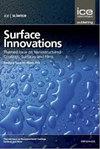Interfacial behavior of intravitreally injected drugs simulated by models of the silicone oil filled eye
IF 3.5
4区 材料科学
Q3 CHEMISTRY, PHYSICAL
引用次数: 1
Abstract
The paper is devoted to the interfacial aspects of the intraocular behavior, migration and distribution of commonly injected ophthalmic drugs in eyes filled with medical-grade 1300 cSt silicone oil used as a retinal tamponade agent. Novel in vitro and ex vivo models were created for studying the physical properties of the retinal surface and interfacial spreading of the ophthalmic drugs over retinas. In vitro model experiments showed that droplets of all tested drugs sank rapidly in the silicone oil to contact with the plasma-treated glass, and then rapidly spread over the glass surface. In the ex vivo model, the migration phase was followed by contact with, and rapid spread/absorption by the retinal interface. The wetting behavior of drugs under contact with the glass substrate and retinas was similar. Characteristic time scales of drugs spreading, controlled by the viscous dissipation, were close. All tested drugs migrated to the retinal surface and rapidly spread across the retinal surface. This suggests that intravitreal drugs might be used effectively in eyes filled with a silicone oil tamponade, as they rapidly migrate to, and spread over the retinal surface.用硅油填充眼模型模拟玻璃体内注射药物的界面行为
本文致力于研究医用1300级填充物眼中常用眼科药物的眼内行为、迁移和分布的界面方面 cSt硅油,用作视网膜填塞剂。建立了新的体外和离体模型,用于研究视网膜表面的物理性质和眼科药物在视网膜上的界面扩散。体外模型实验表明,所有测试药物的液滴在硅油中迅速下沉,与等离子体处理的玻璃接触,然后迅速扩散到玻璃表面。在离体模型中,迁移阶段之后是与视网膜界面的接触和快速扩散/吸收。药物在与玻璃基质和视网膜接触时的润湿行为相似。在粘性耗散的控制下,药物扩散的特征时间尺度是接近的。所有测试的药物都迁移到视网膜表面,并迅速扩散到视网膜表面。这表明,玻璃体内药物可能在充满硅油填塞物的眼睛中有效使用,因为它们会迅速迁移并扩散到视网膜表面。
本文章由计算机程序翻译,如有差异,请以英文原文为准。
求助全文
约1分钟内获得全文
求助全文
来源期刊

Surface Innovations
CHEMISTRY, PHYSICALMATERIALS SCIENCE, COAT-MATERIALS SCIENCE, COATINGS & FILMS
CiteScore
5.80
自引率
22.90%
发文量
66
期刊介绍:
The material innovations on surfaces, combined with understanding and manipulation of physics and chemistry of functional surfaces and coatings, have exploded in the past decade at an incredibly rapid pace.
Superhydrophobicity, superhydrophlicity, self-cleaning, self-healing, anti-fouling, anti-bacterial, etc., have become important fundamental topics of surface science research community driven by curiosity of physics, chemistry, and biology of interaction phenomenon at surfaces and their enormous potential in practical applications. Materials having controlled-functionality surfaces and coatings are important to the manufacturing of new products for environmental control, liquid manipulation, nanotechnological advances, biomedical engineering, pharmacy, biotechnology, and many others, and are part of the most promising technological innovations of the twenty-first century.
 求助内容:
求助内容: 应助结果提醒方式:
应助结果提醒方式:


